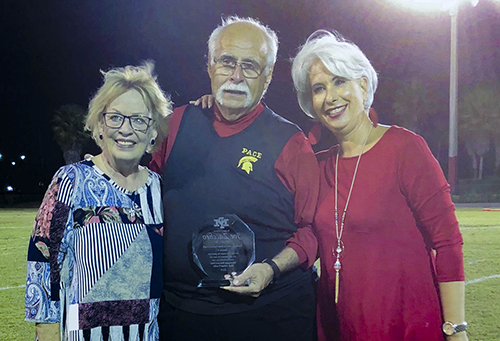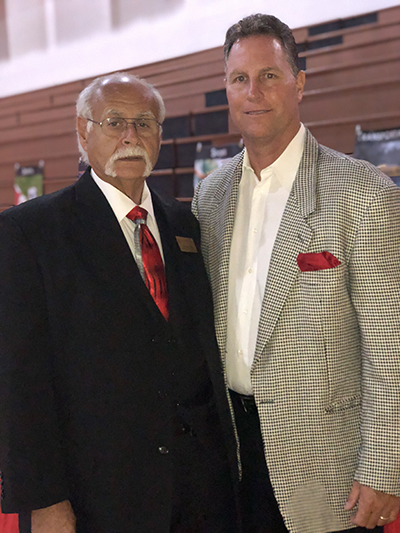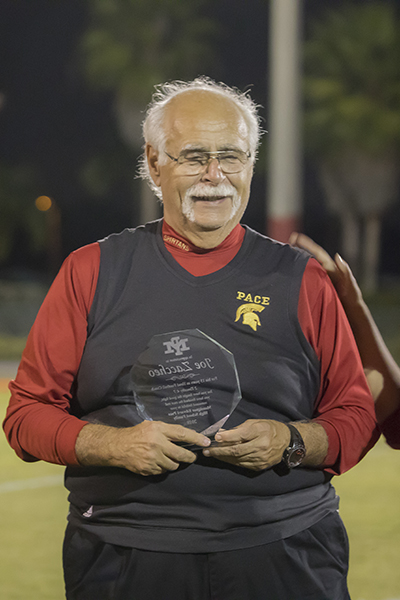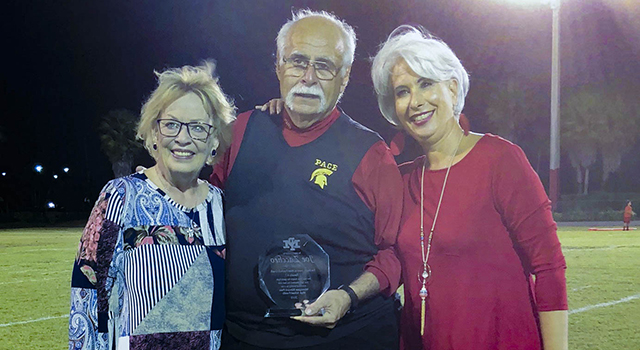By Lynn Ramsey - Florida Catholic

Photographer: COURTESY
Msgr. Pace High School football coach Joe Zaccheo is pictured here with wife, Carol, left, and Pace principal Ana Garcia, after being recognized at the annual Turkey Bowl between Belen and Pace in November 2018.
MIAMI GARDENS | When Msgr. Edward Pace High School called Joe Zaccheo back into the coaching ranks a few years back, he couldn’t say anything but yes. He’s given his life to the school and shaping men with the traits he lived � God, family, education, football.
Zaccheo is retiring at the end of this school year. The 69-year-old coached the Spartans in his last regular-season home game in the Turkey Bowl clash against Belen Jesuit Nov. 2. Despite a 32-7 loss, Pace made the playoffs and hosted one more game against Gulliver Prep that only delayed the inevitable: Zaccheo coached his last game.
The 1969 Miami Central High School graduate’s career has been marked by success. Pace made the playoffs in 1995-2006, winning a 2003 state championship. Dozens of players advanced into the college ranks and a few fortunate ones into the National Football League.
His former players see all that as the payoff for hard work � a payoff that has continued for many beyond the playing field.
“He was a hard-nosed guy,” said Conredge Collins, a first-team all-state running back on the 2003 championship team. “He told it like it was. He taught us the camaraderie. He taught us the value of digging in the dirt and reaping the benefits of putting in the hard work.”
Joel Rodriguez, a three-time All-Big East offensive lineman at the University of Miami, said Zaccheo demanded no less of his players than he demanded of himself. He saw that when he walked into his first workout at Pace.
“My first impression was how he was able to manage so many things,” said Rodriguez, who was initially at Pace to play basketball but was pulled into football out of the hallways. “He was head coach, offensive coordinator; he could coach any position. He had to manage the personalities on the staff and in the locker room. He made everyone he touched feel like he was super important.”
Zaccheo still demands much of himself, even in his last days as a head coach. He is serving as Pace’s athletic director, football coach and transportation director.
GOD, FAMILY, EDUCATION, FOOTBALL
Zaccheo said that football success starts with academics. If the players do well in school, they’ll do well in football. “If you’re an average player with great grades, I’ll get you into a great school,” Zaccheo said. “If you’re a great athlete with bad grades, you’ll be on the street corners.”

Photographer: COURTESY
Msgr. Pace High School footbal coach Joe Zaccheo is pictured here with Tom Duffin, a class of '85 Pace alumnus. Coach Duffin, Pace's head baseball coach for 20 years, will succeed Zaccheo as athletic director.
“My philosophy is God, family, education, football. Take care of the first three, and football will fall into place.”
He still enforces a mandatory study hall, managing it himself. He arranges the tutoring, hoping to give his players a head start in daily homework.
Principal Ana Garcia said that’s one thing that’s endeared Zaccheo to the school and staff: He mirrors their emphasis on academics. “He’s known to sit out kids who don’t do what they’re supposed to do,” Garcia said. “He supports the teachers and the administration. If a teacher is having a difficult time with a football player, they go to Coach Zaccheo, and the problem is resolved.”
In recent years, he faced challenges instilling that philosophy. He said that many youth-league coaches extol athletics over the academics. That forced him to de-program what many star players have heard since youth-football days.
“The kids, if they have any talent at all, the guys in the youth leagues tell them how great they are,” Zaccheo said. “There’s too many outside influences that want to tell the kids what they should be doing. The greatest challenge is the attitude.”
GET TO WORK � EVEN IN SCHOOL
Many of his former players said that Zaccheo treated football and school like a business. He demanded not only hard work but integrity. He demanded accountability from his players; he also demanded that the players demand the same from each other.
Collins said that Zaccheo’s hard-nosed style prepared his fellow Spartans for life beyond high school. Spartans players especially learned how to balance the jealous demands of college football and college academics.
“If we didn’t go to class, we were letting our brothers down,” Collins said. “You have to work out right, eat right, keep your nose clean. That’s what we fell into, not just school education but overall education. Be better men. Coach was tough on us.”
Collins said that by the time he got to college, he saw the wisdom in Zaccheo’s drive. “When you respect a coach and understand who that coach is, you’ll have the same respect level for other coaches.”
Garcia said that while Zaccheo had a hard edge to him, he willingly offered help whenever he needed it or pointed the student toward assistance. “When you have one student having a difficult time, on many occasions he’d almost adopt the student. He’d take a special interest in the student and reach out to different people who could help.”
NAVIGATING THE RECRUITING RAPIDS
That’s because Zaccheo shepherded his players at Pace, carved a path for them to college and gave them the tools to pave their own highway. Recruiting showed his wisdom. Rodriguez said that unlike now, when high-school coaches are almost devalued in the recruiting process due to online resources, high school coaches in the early 2000s were gatekeepers.
Zaccheo earned the respect of college coaches, Rodriguez said, because he would not lie to coaches about a player. If a player had integrity on and off the field, he told them so. As a result, players would have their opportunities.

Photographer: JONATHAN MARTINEZ | FC
Retiring Pace football coach Joe Zaccheo receives a commemorative plaque Nov. 2, when the Pace Spartans and the Belen Wolverines had their annual match-up at the Knights of Columbus Turkey Bowl.
“I owe Coach Zaccheo any scholarship offer I received, not only as a recognition of leadership and the game, but also his willingness to say that this is a man who can play Division I football,” Rodriguez said.
Collins said that the recruiting trail that led him to the University of Pittsburgh was a rollercoaster, yet Zaccheo was with him the whole way. Collins wanted another Zaccheo in a college football coach, and he saw that in then-football coach Dave Wannstedt.
“When Wannstedt came down, we already knew him from the Miami Dolphins,” he said. “I was prepped for that type of coach, because they were the same type of coach � running game, tunnel vision, hard-nosed coaches.”
LESSONS CARRY ON IN LIFE
Zaccheo spoke of many former players who are doctors, lawyers and other contributors to society. He mentioned Libnir Telusca, who played some at Pace but got a full scholarship to Vanderbilt. He parlayed that into a career as a research scientist. Maurice Sikes, who was a starting safety at the University of Miami, now defends the public as a sergeant over the motorcycle units with the Coral Gables Police Department. Collins owns Young Bloods United, a clothing line, in addition to his own record label. Rodriguez is now director of player development for defense at his college alma mater.
Rodriguez said Zaccheo was a second father for him. He said he owes Zaccheo for Rodriguez’s entire coaching career. After all, Zaccheo pitched Rodriguez to the University of Mississippi, who was seeking a graduate assistant.
“The coach came in to recruit, and Coach Zaccheo was shooting the breeze with him,” Rodriguez said. “The (recruiting) coach said one of his coaches was leaving. Coach Zaccheo said, ‘I had a guy play for me, played at Miami and the NFL.’ The rest is history.”
Collins said that coach Zaccheo is still coaching him in his career. “I’m still using some of those characteristics and traits � doing the right thing, belief in yourself, doing extra work.”
2003 WAS A WINNER, BUT NOT THE BEST
Zaccheo won one state championship � a 2003 Class 3A crown. Collins and defensive back Quinton Andrews were first-team all-starters, while offensive lineman Anthony Collins, quarterback Jeremy Roberts and defensive lineman James Dillard were also all-state selections.
Collins said that state championship actually snuck up on the Spartans. That team, he said, had some great skill-position players, but the team’s belief in itself carried Pace to the title. “We kept fighting, and toward the end of the season, we turned it into a state championship,” Collins said.
Zaccheo said he had better teams in 1998, 1999 and 2000. Unlike those teams, which lost players to injury as the season wore on, the 2003 team suffered a lot of early injuries and got players back when it mattered.
“All of a sudden, kids came in with doctor’s notes saying they were ready to play,” Zaccheo said. “I think of (the 1998-2000) guys as starting the foundation at Pace. They were the hard-working kids that made it happen.”
The camaraderie of the players continues even to this day. “The great thing about Pace is that when you come to a Pace game, you look on the sideline and there’s alumni all over the place,” Zaccheo said. “When we came out for that last home game, it was an awesome feeling.”
Now, after 40 years in coaching, 30 of them at Pace, Zaccheo said it’s time to travel. He’s considering stints coaching American football in Europe, something he likens to a vacation.
Ultimately, God, family, education and football shape his life. He’s given a bunch to education and football. It’s time to give his family more time. After all, he played his last game at Miami Central in 1968. Why not coach his last game 50 years later?
“It’s time,” he said. “When I coach, I can’t do stuff halfway. You steal from your family. After 30 years and total 40 years in coaching, it’s time to give back to family.”


Comments from readers